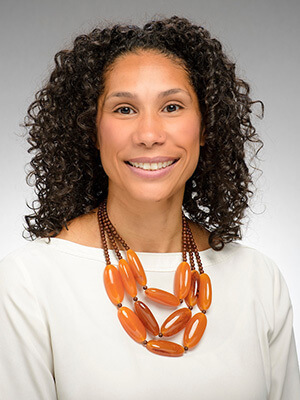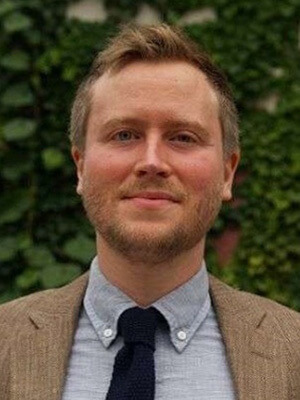Paternal incarceration complicates college plans for Black youth

Most Gen Z young people are characterized as ambitious and forward-thinking, believing all things are possible. But what if you are a teen whose father is, or has been, in prison? How does that affect your outlook on life? How does that affect your optimism in regard to going to college and completing your degree?

University of Notre Dame professors Anna Haskins, the Andrew V. Tackes Associate Professor of Sociology and associate director of Notre Dame’s Initiative on Race and Resilience, and Joel Mittleman, assistant professor of sociology, along with the University of Maryland’s Wade Jacobsen, used data from the Future of Families and Child Wellbeing Study (FFCWS) to determine how 15-year-old children of incarcerated fathers view their own educational futures.
In the study, “Optimism and Obstacles: Racialized Constraints in College Attitudes and Expectations Among Teens of the Prison Boom,” recently published in the journal Sociology of Education, the researchers found that although teens with incarcerated fathers were optimistic about their futures and fully committed to the importance of a college degree, they had lower expectations of actually completing college — and this was especially true for impacted Black youth.
Of the 3,205 youth who responded to the FFCWS survey, about 60 percent of the teens in the sample who experienced paternal incarceration reported that college graduation is very likely, an additional 37 percent reported it as being somewhat likely and 3 percent said it was unlikely.
Their findings, the researchers said, point to the complexity of contemporary teens’ college-related attitudes in the wake of the “prison boom,” the era of mass incarceration in the United States between 1970 and 2010. This 40-year period has resulted in nearly half of Americans reporting that they have had an immediate family member in prison or jail, including more than 2 million children who currently have an incarcerated parent and 10 million children who have had a parent imprisoned at some point in their lives.

Scholars estimate that 1 in 4 Black children, 1 in 10 Latino children and 1 in 25 white children experience parental incarceration by their early teens, the study said. The researchers’ work focused primarily on incarcerated fathers because 93 percent of incarcerated parents are men.
“This research looks at a sample of children that I have followed since they were born,” Haskins said. “I have looked at the impact of a father’s incarceration on them at age 3, 5, 9 and now 15. We know the effects on them as children, but we wanted to see if — and how — those effects continue. And what we’re seeing is that the effects continue to persist into early adulthood.”
Mittleman added that research has already shown that parental incarceration has negative impacts on children’s academic performance beginning at a very young age. “What our study shows is that — even after taking all of those negative impacts into account — the stigma of incarceration itself seems to limit the kind of academic future that Black teens can imagine for themselves,” he said.
Haskins explained that most education research focuses on the tangible consequences of parental incarceration, such as graduation rates and GPAs. “This study examined the psychosocial measures — in other words, how might parental imprisonment impact the way in which teens see their future,” she said.
“Because our criminal legal system is so racialized, it’s not surprising to find this sort of calibrating downward of one’s expectations for oneself,” Haskins said. “But this limits [the student’s] potential and truncates the educational trajectory for this next generation of young people, without them having done anything wrong. And that’s not what we want for them as a society.
“The spillover stigma of familial incarceration can be very stunting for young people,” Haskins continued. “And when you think about it, a college education has massive implications for social mobility and later success in life.”
The impacts of the prison boom are long-lasting, Haskins said, and are influencing more consequential educational life decisions. She suggested two things to help reduce that impact: further research and additional resources targeted toward the most impacted populations.
“The spillover stigma of familial incarceration can be very stunting for young people. And when you think about it, a college education has massive implications for social mobility and later success in life.”
— Anna Haskins
“We need to encourage more research to be done that considers the role of the criminal legal system and how it impacts educational trajectories,” Haskins said. “And if we have Black students with an incarcerated parent, then high school or college counselors can do a little more work in trying to shore up other avenues or other types of support that can bolster them, to help them see their educational futures differently.”
This is something Haskins hopes her research — and further research — can do to help encourage the next generation of college-bound students, regardless of what their parents have done or their time spent in prison.
“Our Notre Dame mission of advancing justice and addressing inequality — walking with those that are struggling — is truly important to me,” Haskins concluded. “It speaks to families that are touched by the criminal legal system in all of their humanity.”
Contact: Tracy DeStazio, assistant director of media relations, 574-631-9958 or tdestazi@nd.edu
Latest Faculty & Staff
- Notre Dame’s Fightin’ Irish Battalion receives Department of Defense award as nation’s top Army ROTC programThe United States Department of Defense honored the University of Notre Dame’s Army ROTC Fightin’ Irish Battalion as the nation’s top Army collegiate program for the 2023-24 academic year. This will be the first time the unit has received the department’s Educational Institution Partnership Excellence Award, which recognizes the program’s achievements in recruiting, educating, training and commissioning leaders of character to be the next generation of military officers.
- In memoriam: Karl Ameriks, the McMahon-Hank Professor of Philosophy EmeritusKarl Ameriks, the McMahon-Hank Professor of Philosophy Emeritus at the University of Notre Dame, died on April 28 from pancreatic cancer. He was 77. Born in post-World War II Germany, Ameriks’ family emigrated to the United States when he was a child, and he grew up in Detroit, Michigan. He received his bachelor’s and doctoral degrees from Yale University. He came to the Department of Philosophy at Notre Dame in 1973 during a formative time for the department, which had transitioned from a predominantly Thomist focus to the more analytical American philosophy in the 1960s.
- Notre Dame psychologist explores how children best learn math — and yes, timed practice helpsUniversity of Notre Dame professor of psychology Nicole McNeil recently co-authored a report that examines the best way for children to learn arithmetic — whether that’s by memorizing number values and multiplication tables, or by studying math at a deeper, conceptual level. The report, “What the Science of Learning Teaches Us About Arithmetic Fluency,” was published in the journal Psychological Science in the Public Interest and shows that children learn most effectively when instruction follows an evidence‑based cycle: grounding facts in conceptual understanding, using brief timed practice to make those facts automatic, and then returning to discussion and reflection to deepen that knowledge.
- ’Tis the season for ticks and mosquitoes. A medical entomologist talks about these pests and how to avoid them.Notre Dame expert Lee Haines explains the risks mosquitoes and ticks pose to the Midwest and discusses how the public can best protect themselves and family members (including pets) from these bloodthirsty pests.
- ND Expert on tariffs and trade policy: ‘How should the US be engaged with the rest of the world?’To make sense of the new administration's recent tariff announcements and policy changes, Robert Johnson, the Brian and Jeannelle Brady Associate Professor of Economics at Notre Dame, explains how tariffs affect global economies and what this means for U.S. engagement in global trade.
- In memoriam: W. David Solomon, founding director of the Center for Ethics and CultureW. David Solomon, associate professor of philosophy emeritus and founding director of the de Nicola Center for Ethics and Culture at the University of Notre Dame, died on February 26, 2025. He was 81.













